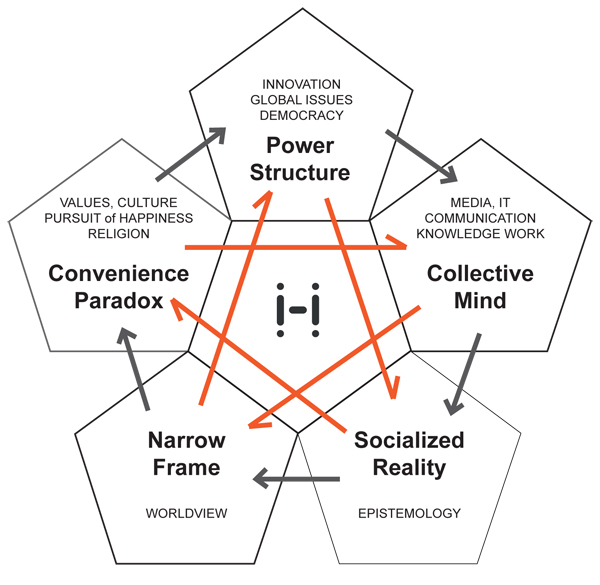Difference between revisions of "Holotopia: Ten themes"
m |
m |
||
| Line 28: | Line 28: | ||
<div class="col-md-7"><h3>Ludens: A Brief History of Modernity</h3> | <div class="col-md-7"><h3>Ludens: A Brief History of Modernity</h3> | ||
<p>While we may be biologically equipped to evolve as the <em>homo sapiens</em>, we have in recent decades devolved to become the <em>homo ludens</em>—who instead of seeking knowledge to understand the world, shuns understanding and adapts by simply learning the rules of the 'game' and 'playing' competitively. By placing this conversation in the context of the [[Holotopia:Collective mind|<em>collective mind</em>]] insight (which tells us that we <em>cannot</em> really see through the complexities of our world, when we look at it 'in the light of a candle') and the [[Holotopia:Socialized reality|<em>socialized reality</em>]] insight (which tells us that while renegade socialization has always been a core cultural issues, we have for interesting reasons surrendered our cultural defenses to the <em>power structure</em>), we provide both for simple understanding of the <em>homo ludens</em> phenomenon, <em>and</em> for all the colorful subtleties. </p> | <p>While we may be biologically equipped to evolve as the <em>homo sapiens</em>, we have in recent decades devolved to become the <em>homo ludens</em>—who instead of seeking knowledge to understand the world, shuns understanding and adapts by simply learning the rules of the 'game' and 'playing' competitively. By placing this conversation in the context of the [[Holotopia:Collective mind|<em>collective mind</em>]] insight (which tells us that we <em>cannot</em> really see through the complexities of our world, when we look at it 'in the light of a candle') and the [[Holotopia:Socialized reality|<em>socialized reality</em>]] insight (which tells us that while renegade socialization has always been a core cultural issues, we have for interesting reasons surrendered our cultural defenses to the <em>power structure</em>), we provide both for simple understanding of the <em>homo ludens</em> phenomenon, <em>and</em> for all the colorful subtleties. </p> | ||
| − | <p>The | + | <p>The [https://holoscope.info/2019/02/07/knowledge-federation-dot-org/#Giddens Nietzsche–Ehrlich–Giddens <em>thread</em>] provides a good entry point into this theme. |
</p> | </p> | ||
</div> </div> | </div> </div> | ||
| Line 39: | Line 39: | ||
| − | + | <!-- XXX | |
<p>The [[Transdisciplinarity and the Future of Science]] conversation combines the [[Holotopia:Socialized reality|<em>socialized reality</em>]] insight and the [[Holotopia:Narrow frame|<em>narrow frame</em>]] insight.</p> | <p>The [[Transdisciplinarity and the Future of Science]] conversation combines the [[Holotopia:Socialized reality|<em>socialized reality</em>]] insight and the [[Holotopia:Narrow frame|<em>narrow frame</em>]] insight.</p> | ||
<p>This is where the academic self-reflective <em>dialog</em> in front of the <em>mirror</em> takes place. Can science step through the <em>mirror</em>—and guide our society along a new evolutionary course?</p> | <p>This is where the academic self-reflective <em>dialog</em> in front of the <em>mirror</em> takes place. Can science step through the <em>mirror</em>—and guide our society along a new evolutionary course?</p> | ||
Revision as of 11:57, 18 June 2020
Contents
H O L O T O P I A P R O T O T Y P E
Ten themes
Black arrows
Governance
Cybernetics of Democracy
This is a play on words, because "cybernetics" means roughly "science of governance" or "science of governability". The basic point that cybernetics has in store for us is that to be viable (or "sustainable"; Wiener uses the technical keyword "homeostasis", which is elegant and more to the point), a system must have some requisite structure ("communication and control" or "feedback and control")—which our governance systems as a rule don't have. Various subtleties or 'spices' are added by placing this conversation in the context of the power structure insight (where the issue of systemic structure is linked with the issue of power) and the collective mind insight (where we see that our communication is profoundly dysfunctional—even though the new media were created to give us the kind of communication we need.
The springboard story here might be about Jørgen Randers and his observation, after 40 years of frontier experience, that "we need a paradigm shift in governance". The Wiener–Jantsch–Reagan thread from the The Paradigm Strategy poster will provide both the big picture and the nuances.
Yes, we really need new 'headlights'!
Culture
Ludens: A Brief History of Modernity
While we may be biologically equipped to evolve as the homo sapiens, we have in recent decades devolved to become the homo ludens—who instead of seeking knowledge to understand the world, shuns understanding and adapts by simply learning the rules of the 'game' and 'playing' competitively. By placing this conversation in the context of the collective mind insight (which tells us that we cannot really see through the complexities of our world, when we look at it 'in the light of a candle') and the socialized reality insight (which tells us that while renegade socialization has always been a core cultural issues, we have for interesting reasons surrendered our cultural defenses to the power structure), we provide both for simple understanding of the homo ludens phenomenon, and for all the colorful subtleties.
The Nietzsche–Ehrlich–Giddens thread provides a good entry point into this theme.
Science
Transdisciplinarity—Future Science

